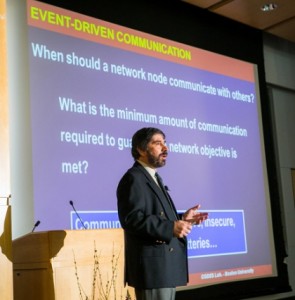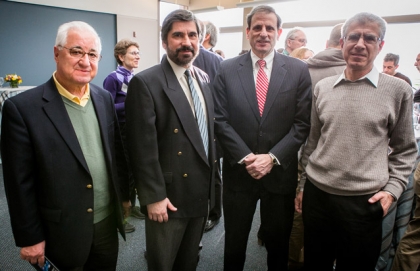让复杂变得简单… at a Small Price
Cassandras Delivers Distinguished Scholar Lecture

For 30 years, Professor Christos Cassandras (ECE, SE) has solved countless complex problems by translating them into simpler terms and then applying optimization, computer simulation and other tools of the systems engineering trade. A pioneer in the field of discrete event dynamic systems analysis, used extensively in the development and operation of manufacturing, transportation, communications and other complex systems, he has laid the mathematical groundwork for everything from swarms of surveillance robots to hassle-free Smart Cities.
On March 19, Cassandras shared some of the most powerful techniques in his problem-solving toolkit in the 2014 College of Engineering Distinguished Scholar Lecture, “Complexity Made Simple* (*at a Small Price).” Speaking from the podium at the Boston University Photonics Center Auditorium, he addressed students, faculty and researchers from throughout the BU academic community and beyond.
有限公司

Cassandras next explored two methods to reduce the complexity of a system to make it easier to model: decomposition, or breaking down a complex system into simpler components, and abstraction, or zooming out to a far less detailed representation of the system. Decomposition can provide fast, accurate solutions to difficult problems; abstraction can dramatically simplify such problems at the “small price” of some loss of accuracy.
“Can the abstraction model be used to predict the real system’s behavior? Bad question,” said Cassandras. “Can the abstraction model be used to control or optimize the real system’s behavior? Good question.”
Finally, he challenged conventional time-driven methods for sampling, control and communication in wireless, networked systems. Noting how communication actions dictated solely by clock time drain precious battery power, exacerbate security risks and are often unnecessary, he argued that these actions could instead be triggered by specific events at the “small price” of identifying suitable action-triggering events. To illustrate the point, he showed how communication among a team of cooperating robots patrolling a defined space could be minimized to achieve a specified goal while saving energy and enhancing security.
Cassandras concluded the lecture by highlighting his ongoing efforts to design Smart Cities that collect data, process information, make decisions and control and optimize actions aimed at making urban life easier, safer and more efficient. He also announced a new endeavor to model the progression of cancer as a discrete event system.
“My hope is to turn this into a new direction of research where discrete event systems analysis can be applied to see how treatment and therapies can be used by simulating how cancer progresses with real data, and play what-if games with drugs,” he said.
Three Decades of Taking on Complexity
A member of the BU faculty since 1996, head of the College’s Division of 系统工程 and cofounder of BU’s Center for Information and 系统工程 (CISE), Cassandras has published five books and more than 300 refereed papers. He was editor-in-chief of the IEEE Transactions on Automatic Control from 1998 through 2009, and the 2012 president of the IEEE Control Systems Society (CSS). He has chaired several technical conferences and served as plenary speaker at various international conferences, including the American Control Conference in 2001 and the IEEE Conference on Decision and Control in 2002, and Distinguished Lecturer for the CSS.
Cassandras’s numerous awards include a 2012 Kern Fellowship, a 2011 prize for the IBM/IEEE Smarter Planet Challenge competition, the 2011 IEEE Control Systems Technology Award, the Distinguished Member Award of the IEEE Control Systems Society (2006), the 1999 Harold Chestnut Prize (International Federation of Automatic Control (IFAC) Best Control Engineering Textbook) for Discrete Event Systems: Modeling and Performance Analysis, and a 1991 Lilly Fellowship. He is also a Fellow of the IEEE and IFAC.
Initiated in 2008, the annual Distinguished Scholar Lecture Series honors a senior faculty member engaged in outstanding, high-impact research at the College of Engineering. The previous five recipients are Professors Thomas Bifano (ME, MSE), H. Steven Colburn (BME), Theodore Moustakas (ECE, MSE), Irving Bigio (BME) and John Baillieul (ME, SE), and Professor Emeritus Malvin Teich (ECE, BME).